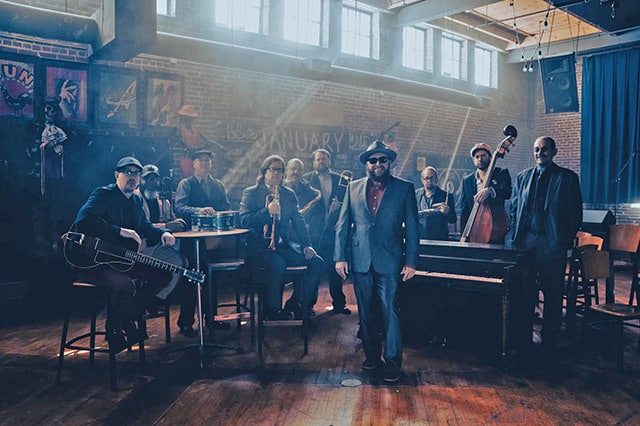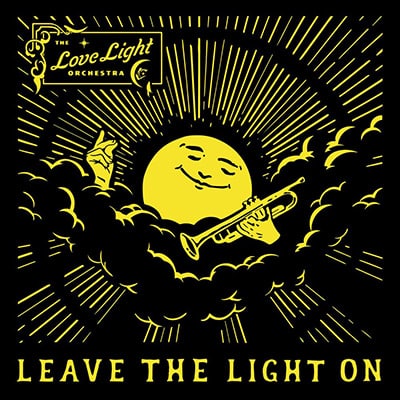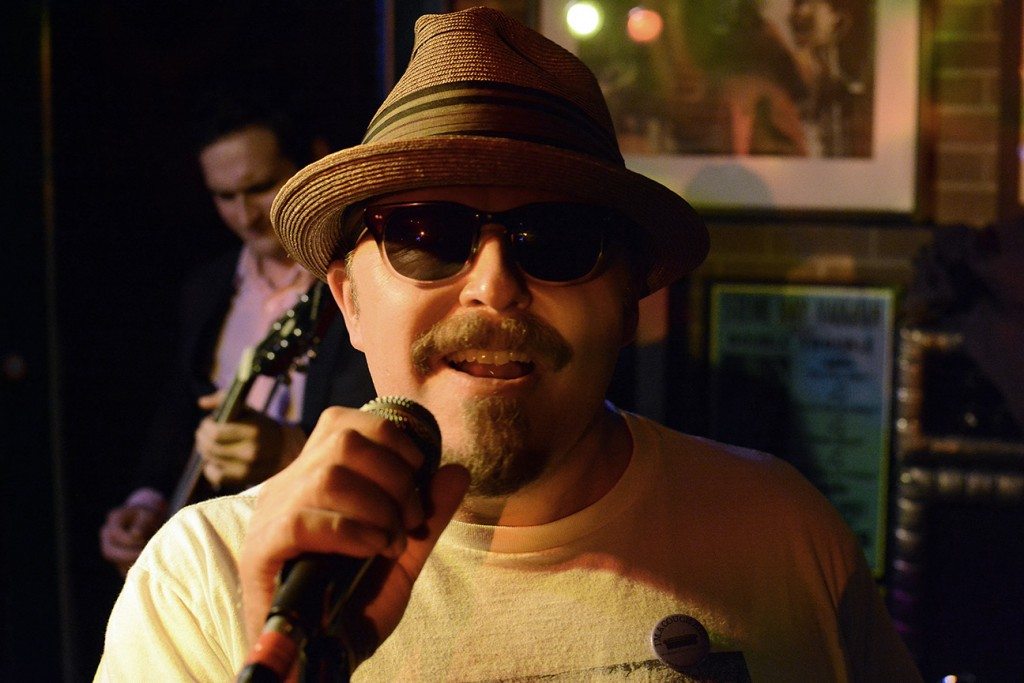
The spirit of the Memphis sound of the 1950s shines with the Love Light Orchestra’s first studio album, “Leave The Light On.”
The producers – singer John Nemeth, trumpeter and horn arranger Marc Franklin and guitarist Joe Restivo – are joined by 10 more of the city’s top musicians. The 10 songs jump as high as Ja Morant does for the Memphis Grizzlies at the end of the street. Love Light Orchestra was informally formed but its popularity is too irresistible to contain, just as The Beale Streeters did.
That collection of artists included Bobby Blue Bland, B.B. King and Junior Parker. “They were talking about love and just trying to see people for people,” Nemeth said. “One thing that they had was that they could sing without alienating anyone but were still getting the message across. We put this together on a lark. Something to do around town. I want to keep the tradition of the songwriting going.”
An album release concert will be held Friday, Feb 18, in the town where Bobby Blue Bland was born, at the Germantown Performing Arts Center. “Leave The Light On” is a reference to Bland’s first major hit song, “Turn On Your Love Light.” It is a follow-up record to the band’s self-titled live album.

Nemeth had just returned from a weeklong Blues Cruise and a citywide power outage during an ice storm when he answered some questions for Tahoe Onstage. Fortunately, the Idaho native has saved his extreme winter clothes.
Question: This is a big band. Was this a difficult album to put together?
Answer: The difficult thing is getting everybody in one spot. The easiest thing about it is the music. The cool comes naturally to these guys. We went in the studio in three different sessions and in just a few hours cut this music live. With a project that big with so many people you wouldn’t think it would be that easy. These guys have known each other for over 20 years. It’s a tight unit. They communicate quickly.
Have you ever sung with such a large band?
I’ve had bands with up to three horns, but never five horns. The horns are arranged like an orchestra, lots of independent parts moving as one piece. It’s hip and I love it. … There’s very few bands with that kind of horn strength. Guys like Duke Robillard, Roomful of Blues, they cut music like that back in the day. It’s kind of its own thing.
And you made this record in a pretty historic place, right?
It was cut at Memphis Magnetic’s new studio, which is a replica of the RCA studio in Nashville, it’s a great sounding room and then we mixed it at Sam Phillips (Recording Studio) and we used all those echo chambers and plate reverbs and all that to get the lushness that you hear on all those Bobby Blue Band and B.B. King and Junior Parker records.
Was the guitar added to the mix?
No, that’s just the way Joe Restivo plays. He’s playing like a real blues guy. He plays in the Bo-Keys and The City Champs, a soul-jazz group. He’s money every time. He’s fierce.
How did you like working with Marc Franklin?
He does arrangements for at least half of everything that’s done in town and people who come to town to record here. He’s one of the best reasons to live in Memphis if you like horns. That guy’s just dynamite. His charts are powerful and they just lift the whole thing up. When you work with Bobby Blue Bland you’re going to feel the power of that band.
Your records have always been flavored with nostalgia, but this one clearly represents an earlier time.
The music is about now and the feeling is still the same as it was back then. It’s a language thing. Shakespeare wouldn’t sound like Shakespeare if he wasn’t speaking like Shakespeare. This music’s gone around the world and back again so many times. It’s changed the face of the planet. It’s changed everything that we know about music. It’s in everything and it’s everywhere. It communicates to people of all ages, too. Here in Memphis there are as many young people who like the music as there are older people who like the music.
Publicists have called you a crooner. Do you approve of the description?
I like Frank Sinatra. I like Nat King Cole. Bobby Blue Bland would probably be considered a blues crooner. I wouldn’t really consider myself a crooner but I can croon with the best of them, but I don’t know what you’d call me. The tone that I sing at is not necessarily crooning. I think definitely soul, R&B, blues. Soul-blues, that’s what I am. But I think at this day and age in the blues, I am probably considered a crooner.
What the heck you mean?
I hear songs on blues festivals like “Iron Man” and “Don’t Fear The Reaper” and “Highway to Hell.” I can see the relatable point to these rock tunes to blues. But it’s not the same songwriting. It’s rock and roll songwriting and there’s a difference in language but I think people don’t know that anymore. My dad kind of liked the blues music I was listening to. He wouldn’t try to break the door down. I’d play ‘70s rock and roll and he’d get the innuendo of that music and he’d get pissed. It’s different songwriting. Rap is not rock and roll. But the lines are definitely blurred these days. Seventies rock is coming back real strong in the blues.
I love the album you produced for Tiffany Pollack & Co., “Bayou Liberty.” Can you tell me about it?
That was the first project I ever produced. Tiffany came up here with her band, super professional, brilliant musicians. She’s the real deal. I’d love to see her get an opportunity to tour outside of Louisiana. With the pandemic it’s tough to get any of that going if you are somebody new on the scene but that’s a timeless record. That’s going to do well for her forever. She’ll be able to sell those from the stage her whole life. Her songwriting is fantastic. That project was fun.
Have you produced for anyone else?
Jake Friel. He sings blues also sings soul and there’s some country in there. An American roots artist. There are 10 originals and two covers and they’re all dynamite. I’ve gotta find a label for him. We cut it last April but with lack of touring, the music business has really taken a huge hit and these young artists who are out there that are creating the music of the future for their age groups. It’s really tough for them to get out there and get going.
We miss you in California, but it looks like moving to Memphis was a good move for you. When did you arrive?
I moved to Memphis in 2013. I just can’t help but think about how sweet this town is. I bought a sharkskin suit when I first moved to town and Bobby Blue Bland’s “I Should Have Been Gone” was playing in the store. This is ground zero. So much has happened here. So many people have come here to perform this kind of music. It’s worked out great and I’m having a ball.
-Tim Parsons
- The Love Light Orchestra
- ‘Leave The Light On’
- Release: Feb. 18, 2022

